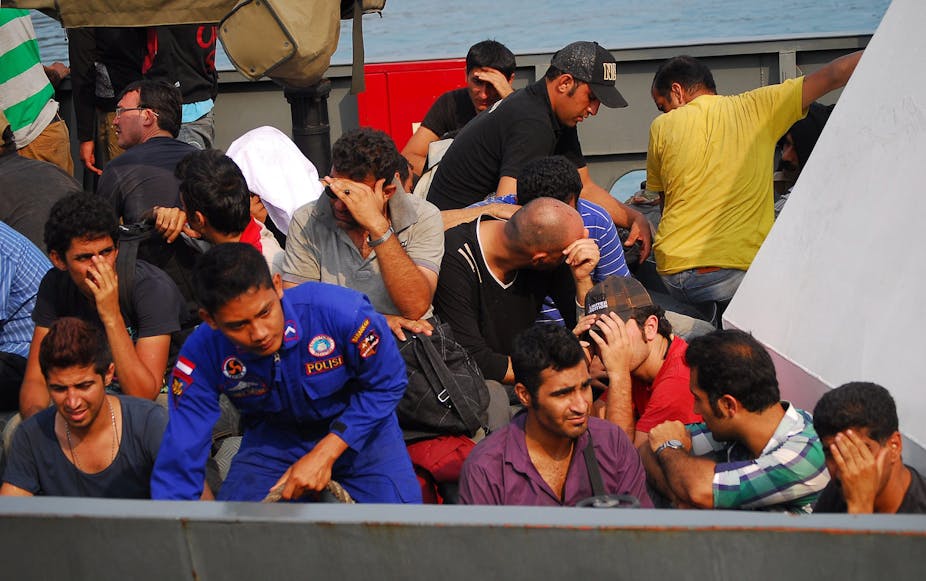If prime minister Kevin Rudd’s recent decision to process and then resettle all onshore asylum seekers in PNG is to be considered in any way a “success”, then it raises the question of what constitutes success in matters of immigration policy.
Over the years, Australia’s immigration policy has been developed by weighing up various factors such as national sovereignty, being a responsible global citizen and acknowledging that asylum seekers are an issue affecting many countries around the world. This latter point is sometimes described as the need for “burden sharing”. Others have noted that actions by countries in the global north towards asylum seekers arriving directly onshore in particular is tantamount to “sub-contracting” out their responsibilities.
As a sovereign nation and signatory to relevant legal conventions, Australia has had to balance the entry of asylum seekers and processing of their claims with its protection obligations. It is arguable that sending all boat arrivals to another country tips the balance in favour self-interest and allows Australia to avoid its responsibilities altogether.
As others have noted, a reduction in boat arrivals is only a limited measure of success that needs to be judged against other regional standards. The Australian government also needs to be held to account for cooperation on regional measures that focus on criminal activities of people smugglers.
Creating disincentives for people to board boats without accompanying regional measures risks moving the problem “upstream” to countries with less capacity to deal with large numbers of asylum seekers. The same resources devoted towards the current Regional Settlement Arrangement with Papua New Guinea should be matched for cooperation on the Bali Process on People Smuggling, Trafficking in Persons and Related Transnational Crime.
In his previous term as prime minister, Kevin Rudd led the successful charge for Australia’s bid for a temporary seat on the United Nations Security Council. He followed through on this bid as foreign minister. Many of the nations that supported Australia’s bid will be watching with curiosity as to how one of the richest nations in the world today, with a strong economy and low unemployment rate, manages to set a global precedent on obfuscating its responsibilities towards asylum seekers.
While it is clear that Australia will still be responsible in some way for asylum seekers sent to PNG, the creation of a two-tier system based on method of arrival, could encourage other countries to find new ways to flaunt the UN’s refugee convention. This convention expressly states that no asylum seeker should be penalised due to their method of arrival.
There have been varying attitudes to the proposal made by Rudd of re-opening the 1951 Refugee Convention for debate and discussion. Former foreign minister Gareth Evans backs the idea of a review, while international law professor Ben Saul queries whether opening the refugee convention to debate will lead to it becoming weakened down as an instrument for refugee protection.
Yet we have precedent to draw on here. In the early 2000s, the United Nations High Commissioner for Refugees commenced an initiative known as Convention Plus, that looked to broaden the current refugee convention. It ran into problems according to Alexander Betts, when the agenda of governments in the global south on refugee protection did not match the areas that countries in the global north wanted to see action on. Once again, self-interest tips the balance on asylum seekers.
How Australia might lead discussions on reviewing the refugee convention is an important question when one considers current debates about the scale of Australia’s asylum “problem”. Putting aside comments made by foreign minister Bob Carr about the percentage of economic migrants arriving by boat that have been fact-checked and found to be false, the contention that Australia faces a “huge” issue will be news to countries like Italy and Malta.
Italy and Malta together received 15,000 migrants and asylum seekers in 2012 and a further 8,400 people in the first half of this year. The Horn of Africa region also received 29,469 migrants attempting to cross the sea to Yemen in the first quarter of 2013 alone. Deaths at sea are also a pressing issue that the evidence shows cannot be solved by deterrent measures alone.
Australia’s “anywhere but here” strategy reveals that current immigration policies simply equate success with national interest. That this strategy also sets a dangerous precedent by a temporary member of the UN Security Council as to how to act as a responsible global citizen should be cause for concern. It is time that Australia acknowledged that asylum seekers are an issue affecting many countries around the world.
With this, Australia must come to accept and process asylum seekers in its own territory, without complicated “outsourcing” arrangements and two-tiered processes determined on an asylum seekers’ method of arrival. Surely this measure of success is possible.

